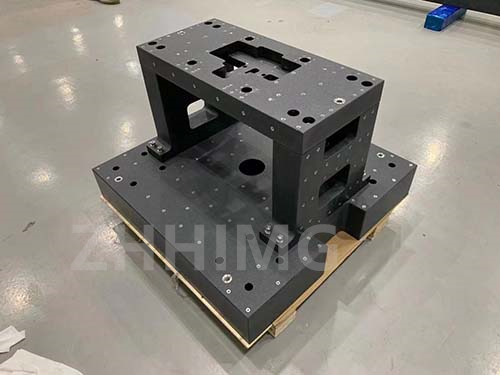Precision granite beds are an essential component of modern manufacturing processes. They are used primarily in industries such as aerospace, automotive and electronics. These beds are known for their excellent durability, stability, and low thermal expansion coefficient. However, there is always room for improvement when it comes to precision granite beds. This article will discuss how we can improve the performance and reliability of precision granite beds by improving the material and process.
Improvement in Material
Granite is the most popular material used in precision granite beds because of its low thermal expansion coefficient, excellent durability and stability. However, there are other alternative materials that can be used to improve the performance and reliability of precision granite beds.
One of the materials is ceramic. Ceramics have high mechanical strength, low thermal conductivity, and low coefficient of thermal expansion. They are suitable for use in high-temperature applications due to their excellent thermal stability. Additionally, ceramics have excellent electrical insulation properties, making them ideal for use in electronic and semiconductor applications.
Another material that can be used is steel. Steel has high tensile strength and can withstand heavy weight loads. It's also cost-effective and has excellent thermal stability. However, steel may not be as stable or durable as other materials, and it can be prone to rusting if not maintained properly.
Improvement in Process
Improving the process used to manufacture the precision granite bed can also have a significant impact on its performance and reliability.
One way to improve the process is by using computer numerical control (CNC) machines. CNC machines are programmed to produce accurate and precise cuts, ensuring that the granite bed is manufactured to the exact specifications required for its intended use.
Another way to improve the process is by using advanced machining techniques and equipment. For example, water jet cutting is a precise and accurate cutting technique that allows for the creation of intricate shapes and designs. It's ideal for creating complex parts that require high accuracy and precision.
Finally, improving the surface finish of the precision granite bed can also improve its performance and reliability. By using advanced polishing techniques and equipment, it's possible to create a smoother surface finish that reduces friction between the precision granite bed and other components. This helps reduce wear and tear, which can significantly improve the bed's durability and sturdiness.
Conclusion
Precision granite beds are essential components of modern manufacturing processes. Improving the performance and reliability of these beds can be accomplished by using alternative materials such as ceramics or steel, improving the manufacturing process, and improving the surface finish. These improvements will ensure that precision granite beds continue to be a reliable and long-lasting asset to manufacturing and other industries.
Post time: Feb-26-2024

